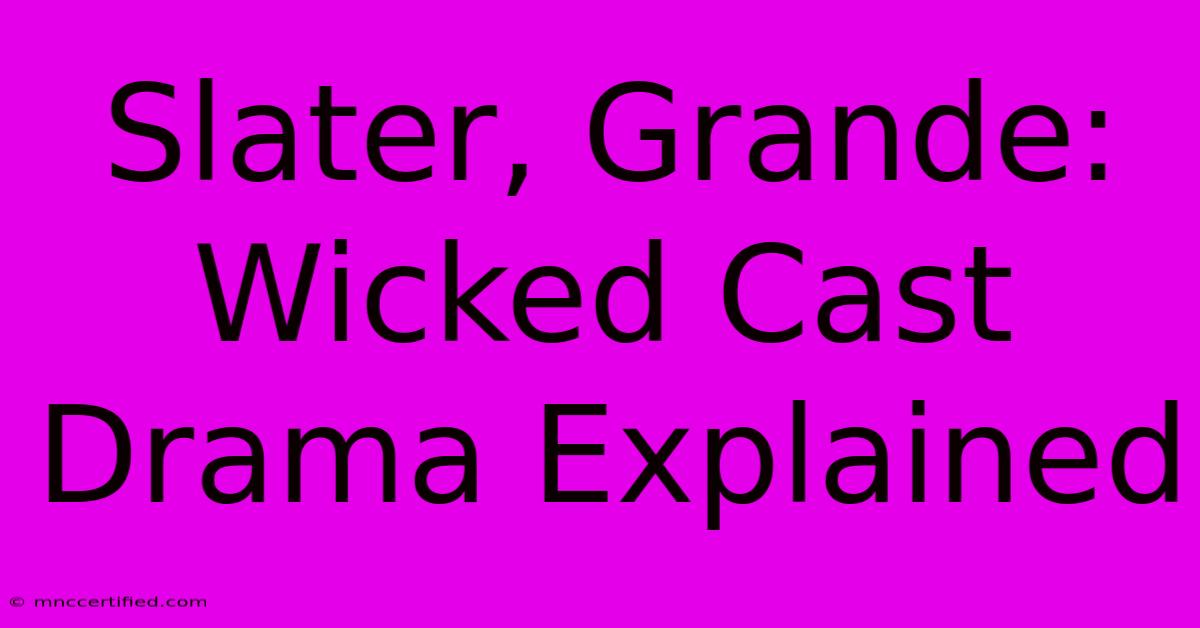Slater, Grande: Wicked Cast Drama Explained

Table of Contents
Slater, Grande: Wicked Cast Drama Explained
The highly anticipated film adaptation of the Broadway smash hit, Wicked, has been generating buzz long before its scheduled release. However, recently, the casting choices have ignited a firestorm of debate and controversy, particularly surrounding the casting of Jonathan Bailey as Fiyero and Ariana Grande as Glinda. This article delves into the drama surrounding the Wicked cast, focusing specifically on the reactions to Ariana Grande and Jonathan Bailey's casting. We'll explore the reasons behind the online controversy and dissect the various perspectives involved.
The Initial Excitement and Subsequent Backlash
The announcement of Ariana Grande and Jonathan Bailey as Glinda and Fiyero respectively was initially met with immense excitement. Both actors boast massive fanbases and significant acting experience. Grande, a pop superstar known for her powerful vocals and stage presence, seemed a natural fit for the bubbly and popular Glinda. Bailey, celebrated for his roles in Bridgerton and Company, brought a level of charm and charisma that many felt suited Fiyero perfectly.
However, this initial wave of enthusiasm quickly gave way to a significant backlash. A segment of the Wicked fanbase expressed disappointment and even outrage, focusing on several key arguments:
Concerns about Type Casting and Character Authenticity
Some critics argued that Grande's casting felt like "type-casting," pointing to her pop-star persona and suggesting she may not convincingly portray Glinda's more nuanced aspects. Similarly, concerns were raised about whether Bailey's established image aligned perfectly with the character of Fiyero. These critiques highlighted a desire for actors who could embody the characters' full depth and complexity rather than simply their outward appearances.
The Importance of Representation and Diversity in Casting
Another layer of the controversy involves the wider discussion surrounding representation in casting. The original Broadway production and subsequent iterations have featured a diverse range of actors portraying the various roles in Wicked. Some critics felt that the chosen cast for the film adaptation lacked sufficient diversity compared to the stage productions, sparking conversations about inclusivity in Hollywood. This argument underscored the importance of reflecting the diverse audiences that have embraced Wicked over the years.
Analyzing the Online Discourse: Social Media and Fan Reactions
The online discourse surrounding the Wicked casting has been intense, fueled primarily by social media platforms like Twitter and Instagram. Fan reactions have been highly polarized, with fervent defenders of the chosen actors clashing with those expressing their disapproval. The hashtag #WickedMovie became a battleground for expressing opinions, both positive and negative. Many online discussions have highlighted the challenges of adapting a beloved stage production to the big screen and the complexities of balancing fan expectations with the director's artistic vision.
The Power of Fandom and the Pressure on Actors
The intensity of the online response highlights the power of fandom and the immense pressure placed on actors chosen for high-profile roles. The passionate engagement from fans, while demonstrating the enduring popularity of Wicked, also underscores the challenges of satisfying a diverse and demanding audience. This intense scrutiny serves as a reminder of the unique pressures that come with adapting a beloved piece of theatre.
Conclusion: Beyond the Drama, Anticipation Remains
Despite the controversies surrounding the casting, the anticipation for the Wicked film adaptation remains high. The production boasts a star-studded cast, a talented creative team, and the promise of a visually stunning spectacle. The drama surrounding the casting choices, while significant, will likely not overshadow the overall excitement for the film's release. Ultimately, the success of the film will depend on its execution, its faithfulness to the source material, and its ability to capture the magic of the original Broadway production for a new generation of audiences. Only time will tell if the casting choices prove to be a boon or a detriment to the film's reception. The debate, however, serves as a fascinating case study in the power of fandom, the complexities of casting, and the evolving expectations surrounding representation and diversity in Hollywood.

Thank you for visiting our website wich cover about Slater, Grande: Wicked Cast Drama Explained. We hope the information provided has been useful to you. Feel free to contact us if you have any questions or need further assistance. See you next time and dont miss to bookmark.
Featured Posts
-
Shared Bedrooms A Royal Tradition
Nov 23, 2024
-
Chester Security Alert Bus Station Evacuated
Nov 23, 2024
-
Chelseas James Injured Again
Nov 23, 2024
-
Laparoscopy Cost Without Insurance
Nov 23, 2024
-
Nuno Mendes Latest Injury Report From Coach
Nov 23, 2024